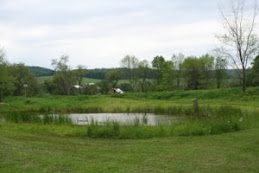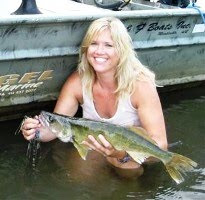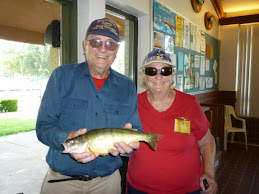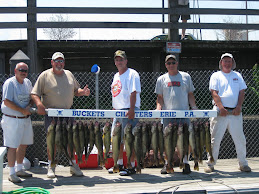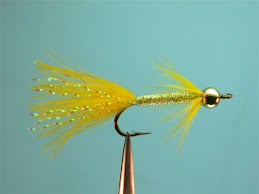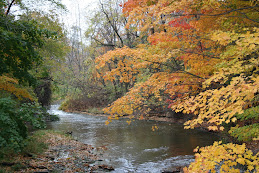
TROUBLED WATERS: THE PUBLIC-PRIVATE DEBATE
Fly Fisherman magazine Feb. 2008
by Deborah Weisberg
by Deborah Weisberg
photo of Little Juniata River at Spruce Creek
by Deborah Weisberg
(Spruce Creek) Dairy farmer Terry Allison is too busy to fish, but has always enjoyed watching anglers on the Little Juniata River, a blue ribbon trout stream that runs through his Central Pennsylvania land.
”I like seeing kids fishing with their families,” said Allison, the father of five children, ages 12 to 20. “We’ve never had a problem with fishermen.”
So, when Donny Beaver, his upstream neighbor and operator of the exclusive Spring Ridge Club, repeatedly approached him, wanting to pay him to deny public access to the river, Allison said no. “He offered me something like $6000 a year if I’d let just his club members through,” recalled Allison. “He said there’d be more if the lawsuit came out in his favor. He told me my neighbors were signing on with him, so I might as well, too. But then you talk to your neighbors and find out that isn’t true.”
Last year, Beaver lost his battle over the river itself with three Commonwealth agencies, including the Pennsylvania Fish and Boat Commission, and a local fishing guide, when Huntingdon County Common Pleas Court Judge Stewart Kurtz ruled that the “Little J” is navigable. Kurtz’s 57-page opinion came seven months after a one-week non-jury trial in which historians for the Commonwealth-----the plaintiff in the case----proved the river was used for commerce by early pioneers, which ensures its status as navigable, and, thus, held in trust for the public, today. Kurtz subsequently ordered Beaver not to advertise a 1.3-mile stretch of the Little J near Spruce Creek as private, not to post or hang signs on the river, and not to “threaten, harass or otherwise attempt to exclude” the public from wading, floating or fishing there. Beaver, who would not comment for this story, is appealing the ruling. (Beaver earlier this year dropped his appeal.)
In the months following Kurtz’s order, which states that a public easement exists between the low and high water marks, Beaver also found himself in hot water with Norfolk Southern Corp., which demanded that he remove No Trespassing signs and barbed wire he had snaked through dense brush on railroad turf on the opposite side of the river. They were similar to signs and orange-capped metal posts Beaver had staked in and along the riverbed in what Pittsburgh-based attorney Stanley M. Stein characterized as “petty, mean-spirited, and a reckless endangerment to the public.”
An avid fly angler, Stein represents Spruce Creek fishing guide Allan Bright, the lone individual plaintiff in the case, who is seeking damages caused by years of Beaver’s efforts to privatize the river. “There’s the loss of business, which can be measured by Donny Beaver and the club’s profits,” said Stein. “And there’s the psychological impact of what Beaver has done, the anxiety he’s caused Allan, the pressure Beaver has put him under for years. It’s difficult to put a value on that kind of aggravation." Conflicts such as this one are not unique to the Little J, as a public-private tug of war---whether over water, submerged land, riparian land, or all three---gets played out on fisheries, nationwide.
Sometimes, opponents of free access try to get state laws changed. In recent years, Oregon property owners backed a bill that would have restricted water rights for anglers and boaters. A group of Ohioans also tried the legislative route in their quest to control the Lake Erie shoreline. Failing that, they filed a class action suit against the Buckeye state that could ultimately keep the public off Erie beaches. Coastal regions, including the Great Lakes, have shown an increase in recreational fishing in recent years, as well as struggles for shoreline access. But inland lakes and waterways are also under siege by those seeking exclusive use of, and in many cases a chance to make money from, natural resources.
Although Spring Ridge Club members no longer have sole use of the Little J at Spruce Creek, their $75,000 membership fee and $6000 more in annual dues entitle them to undisputed use of dozens of smaller streams. Undaunted by the court decision, Beaver continues to lease waterways in Pennsylvania and neighboring states, including Ohio. To the outrage of anglers, Beaver is renting water on Conneaut Creek, which Ohio state fisheries managers have spent decades-----and millions of dollars in public funds----cultivating into a world-class steelhead stream. Unlike Pennsylvania, Ohio allows for private ownership of some navigable waterways.
When it comes to water wars, BASS---the tournament group with a conservation ethic----has characterized public access as one of the top environmental crises facing anglers, on a par with loss of habitat and invasive weeds. Gated communities are turning public lakes into personal playgrounds, destroying vegetation that interferes with Jet Skis, and chasing anglers from docks, according to BASS conservation director Chris Horton. “If you squeeze off access, it doesn’t much matter if a lake is public or not.”
The public-private debate is an ancient one, said John D. Echeverria, executive director of the Georgetown Environmental Law & Policy Institute. What he characterized as elitist attitudes about property control can be traced to the king of England, with references to deeds to the crown surfacing in court cases from Maryland to New York. “The US has a pretty strong tradition of the right to exclude people from private land, of posting and barring trespassers,” he said. “Look at the robber barons of the early 19th Century locking up tens of thousands of acres in the Adirondacks for their own use.”
But there has been an equally strong tradition of neighbors granting free access, and a presumption in most states that land is open unless you post it, he said. That heritage is fading, as developers subdivide farmlands into housing plans and shopping malls, and neighbors become unfamiliar, he said. While access to waterways has gotten tighter and more complicated, rights on the water itself have triggered a flood of new conflicts. “In legal terms,” Echeverria said, “the difference between water and land use is the difference between night and day.”
New Jersey Deputy Public Advocate Brian Weeks, an attorney, agreed. “You can own land entirely, but, with water the first issue is, who has rights to it, regardless of ownership. There are legally regulated actions for virtually everything having to do with water…damming, diverting, stocking, fishing, floating, wading, etc. There are even rights for the fish.”
To compound matters, the common law regarding water and submerged land varies from region to region, and legislative enactments from state to state. “The Dakotas are wide open. You go to the Northern Rockies and Montana and they’ve got very aggressive programs of creating public fishing points,” said Echeverria. “Go to Wyoming and you will have a helluva time finding a public fishing point to access. The public access tradition is much longer and stronger in Montana. Wyoming was always less progressive----never very big on the rights of the public when it comes to fishing.”
But even where laws favor the public’s right to fish, access is being thwarted in other ways, said Weeks. “Part of the problem in Montana is the scope. You’ve got rich folks who can buy land the size of New Jersey-----whole valleys with rivers running through them. That makes access not so much a legal issue as a practical one, where a fisherman can’t just jump into his car and find somewhere else to go.”
Such is the case on the Ruby River, which flows through the 4000-acre ranch of media magnate James Cox Kennedy. Elsewhere in Montana, rocker Huey Lewis, discount broker Charles Schwab and other ranchers are trying to end public fishing on the Mitchell Slough by contending that it is an irrigation ditch and not a fork of the Bitterroot River.
Although the gap between those making more than $350,000 a year and everyone else is the widest since the Great Depression, Echeverria said the public-private debate is as much about philosophy and values as it is economics. “Some people think of enjoying a natural resource as a social experience. We meet people on the stream, have encounters, share fishing lore,” he said. “Others see streams as trophies. The private stream is a rich person’s toy, like a yacht or an antique car. It’s a luxury good you can brag about.””It’s the issue that divides the lunch pail fisherman from the Orvis angler.”And it appears the lunch pail faction-----or as Beaver, a director of the Pennsylvania Landowners Association, calls it, “the free lunch crowd”----- is losing ground, according to the latest census data from the US Fish and Wildlife Service, which began tracking private ownership of fishing lands a decade ago. While the number of anglers declined by four percent from 1991 to 2001, property purchases for fishing more than tripled, with people paying $500 million for riparian land — an increase of 17 percent. More people paid to access private water through fees or leases and they spent 27 percent more for the privilege.
Recreational land is such a hot commodity that even Cabela’s, the global outfitter, now leases or sells “trophy” properties through the same catalogues that offer tackle and clothing, to the dismay of traditional sportsmen. “You open the page expecting to see shotguns and there’s your favorite fishing hole,” said Hal Harper, chief policy advisor to Montana Gov. Brian Schweitzer. “These lands go for very high prices and are being bought sight unseen by people in other states…to the point it’s forcing young agricultural couples out of business. The first thing that happens is the No Fishing, No Hunting signs go up, and more land is taken out of play for the normal hunter and angler.”
That is precisely what advocates of privatization applaud.
”I support profiting from natural resources,” said Terry L. Anderson, an economist who runs the Bozeman-based Property and Environment Research Center, which touts market solutions to conservation problems and includes among its directors Leigh Perkins, chairman of The Orvis Company. Perkins declined to comment for this article.“We as fishers, hunters, and sportsmen and women have to decide, is it the resource---the fish and habitat---that matters, or is it access that matters?” he said. “I read Aldo Leopold and he cared mostly about the resource. If well-managed, access to the public was a secondary view.”
You can seldom have both, said Anderson, who sees “enviropreneurship” as a backlash to poor resource management by governments. “Their approach is to increase access and stock more fish. But increased pressure on fishing resources has caused the experience to deteriorate, and, therefore, make people more willing to pay to fish privately managed streams.”Profitability fosters good stewardship, he said. ”If it pays, it stays.”The appeal for some is elitism but more put a premium on fishing in a peaceful place, he said. “I think people simply are tired of the elbow-to-elbow bumper boat fishing experience. If I had to choose between catching small fish in solitude or big fish on a crowded stream, I’d take the small fish any day.”
The concept of capitalizing on nature has been slow to catch on in the US, but is growing, Anderson said. ”It’s a staunchly American ideal that the king ought not to own the fish, and that has made marketing of fisheries more difficult. It’s hard to keep a good market down, however, especially as the pressure on natural resources gets higher.”He likens waterways to other recreational venues. “No one says skiing should be free…or golf. Maintaining a stream is not something that God or Mother Nature somehow taps with a magic wand and leaves that way. These are lands with houses around them and septic tanks nearby, and all of that requires management, especially with increasing pressure from other demands on resources,” he said.
And while some streams are cost prohibitive to all but a wealthy few, others are affordable, he said. “You might be able to purchase a BMW, and I might only be able to afford a KIA. Some streams are $75 a day to fish. They’re the KIA------nice, but not like the $80,000 BMW. That’s the kind of evolution of markets that is happening in the US now.”
But champions of free access also are turning to the private sector, where they are marketing easements, tax incentives, and the transfer of development rights.
“Terry’s right about private sector stewardship, but not to the point of ownership,” said Michael Warburton of the Public Trust Alliance, a San Francisco-based project aimed at protecting public interests. “Communities should never give up their trust interest in shared resources.”
Although states are the legal guardians of natural resources, they are often victims of political pressures that can trump the best interests of the public, he said. “That’s why trust alliances have to emerge from the non-profit sector.” Scores of organizations, such as the Trust for Public Land, are spending billions of dollars buying and conveying property to public agencies on some of the most prized fisheries in America, including the Madison River, west of Yellowstone National Park in Montana.
The American Canoe Association created a 740-mile testament to the public trust when it created the Northern Forest Canoe Trail through painstaking negotiations with state officials and private landowners from New York to Maine. “They looked at local laws in excruciating detail and figured where you’d have to portage and made arrangements so it would all be legal,” said Weeks. “They even looked at when the salmon would be running on some streams for those who wanted assurance that they could float and fish. It took years, but it’s a great example of how well partnerships can work.”But private-public partnerships also can be fraught with conflicts of interest and other problems, Warburton said. “The Nature Conservancy has been known to develop portions of properties they were supposed to have acquired for the public trust, and have engaged in economic arrangements that benefit officers and directors.””In some cases, trusts use public funds to buy resources that should be public anyway---for astonishing sums----and then transfer the money to private interests. With regard to easements, they’re supposed to run with the land in perpetuity, but are new deed holders doing other things with the property?”
Vigilance by state agencies and well-informed citizens is critical to preserving the public trust, when it has never been more threatened, Warburton said. “Some things cannot be owned outright. Some things are so fundamental to civic function they can’t be treated as ordinary property. Water, as it flows, is one of them.”
by Deborah Weisberg
(Spruce Creek) Dairy farmer Terry Allison is too busy to fish, but has always enjoyed watching anglers on the Little Juniata River, a blue ribbon trout stream that runs through his Central Pennsylvania land.
”I like seeing kids fishing with their families,” said Allison, the father of five children, ages 12 to 20. “We’ve never had a problem with fishermen.”
So, when Donny Beaver, his upstream neighbor and operator of the exclusive Spring Ridge Club, repeatedly approached him, wanting to pay him to deny public access to the river, Allison said no. “He offered me something like $6000 a year if I’d let just his club members through,” recalled Allison. “He said there’d be more if the lawsuit came out in his favor. He told me my neighbors were signing on with him, so I might as well, too. But then you talk to your neighbors and find out that isn’t true.”
Last year, Beaver lost his battle over the river itself with three Commonwealth agencies, including the Pennsylvania Fish and Boat Commission, and a local fishing guide, when Huntingdon County Common Pleas Court Judge Stewart Kurtz ruled that the “Little J” is navigable. Kurtz’s 57-page opinion came seven months after a one-week non-jury trial in which historians for the Commonwealth-----the plaintiff in the case----proved the river was used for commerce by early pioneers, which ensures its status as navigable, and, thus, held in trust for the public, today. Kurtz subsequently ordered Beaver not to advertise a 1.3-mile stretch of the Little J near Spruce Creek as private, not to post or hang signs on the river, and not to “threaten, harass or otherwise attempt to exclude” the public from wading, floating or fishing there. Beaver, who would not comment for this story, is appealing the ruling. (Beaver earlier this year dropped his appeal.)
In the months following Kurtz’s order, which states that a public easement exists between the low and high water marks, Beaver also found himself in hot water with Norfolk Southern Corp., which demanded that he remove No Trespassing signs and barbed wire he had snaked through dense brush on railroad turf on the opposite side of the river. They were similar to signs and orange-capped metal posts Beaver had staked in and along the riverbed in what Pittsburgh-based attorney Stanley M. Stein characterized as “petty, mean-spirited, and a reckless endangerment to the public.”
An avid fly angler, Stein represents Spruce Creek fishing guide Allan Bright, the lone individual plaintiff in the case, who is seeking damages caused by years of Beaver’s efforts to privatize the river. “There’s the loss of business, which can be measured by Donny Beaver and the club’s profits,” said Stein. “And there’s the psychological impact of what Beaver has done, the anxiety he’s caused Allan, the pressure Beaver has put him under for years. It’s difficult to put a value on that kind of aggravation." Conflicts such as this one are not unique to the Little J, as a public-private tug of war---whether over water, submerged land, riparian land, or all three---gets played out on fisheries, nationwide.
Sometimes, opponents of free access try to get state laws changed. In recent years, Oregon property owners backed a bill that would have restricted water rights for anglers and boaters. A group of Ohioans also tried the legislative route in their quest to control the Lake Erie shoreline. Failing that, they filed a class action suit against the Buckeye state that could ultimately keep the public off Erie beaches. Coastal regions, including the Great Lakes, have shown an increase in recreational fishing in recent years, as well as struggles for shoreline access. But inland lakes and waterways are also under siege by those seeking exclusive use of, and in many cases a chance to make money from, natural resources.
Although Spring Ridge Club members no longer have sole use of the Little J at Spruce Creek, their $75,000 membership fee and $6000 more in annual dues entitle them to undisputed use of dozens of smaller streams. Undaunted by the court decision, Beaver continues to lease waterways in Pennsylvania and neighboring states, including Ohio. To the outrage of anglers, Beaver is renting water on Conneaut Creek, which Ohio state fisheries managers have spent decades-----and millions of dollars in public funds----cultivating into a world-class steelhead stream. Unlike Pennsylvania, Ohio allows for private ownership of some navigable waterways.
When it comes to water wars, BASS---the tournament group with a conservation ethic----has characterized public access as one of the top environmental crises facing anglers, on a par with loss of habitat and invasive weeds. Gated communities are turning public lakes into personal playgrounds, destroying vegetation that interferes with Jet Skis, and chasing anglers from docks, according to BASS conservation director Chris Horton. “If you squeeze off access, it doesn’t much matter if a lake is public or not.”
The public-private debate is an ancient one, said John D. Echeverria, executive director of the Georgetown Environmental Law & Policy Institute. What he characterized as elitist attitudes about property control can be traced to the king of England, with references to deeds to the crown surfacing in court cases from Maryland to New York. “The US has a pretty strong tradition of the right to exclude people from private land, of posting and barring trespassers,” he said. “Look at the robber barons of the early 19th Century locking up tens of thousands of acres in the Adirondacks for their own use.”
But there has been an equally strong tradition of neighbors granting free access, and a presumption in most states that land is open unless you post it, he said. That heritage is fading, as developers subdivide farmlands into housing plans and shopping malls, and neighbors become unfamiliar, he said. While access to waterways has gotten tighter and more complicated, rights on the water itself have triggered a flood of new conflicts. “In legal terms,” Echeverria said, “the difference between water and land use is the difference between night and day.”
New Jersey Deputy Public Advocate Brian Weeks, an attorney, agreed. “You can own land entirely, but, with water the first issue is, who has rights to it, regardless of ownership. There are legally regulated actions for virtually everything having to do with water…damming, diverting, stocking, fishing, floating, wading, etc. There are even rights for the fish.”
To compound matters, the common law regarding water and submerged land varies from region to region, and legislative enactments from state to state. “The Dakotas are wide open. You go to the Northern Rockies and Montana and they’ve got very aggressive programs of creating public fishing points,” said Echeverria. “Go to Wyoming and you will have a helluva time finding a public fishing point to access. The public access tradition is much longer and stronger in Montana. Wyoming was always less progressive----never very big on the rights of the public when it comes to fishing.”
But even where laws favor the public’s right to fish, access is being thwarted in other ways, said Weeks. “Part of the problem in Montana is the scope. You’ve got rich folks who can buy land the size of New Jersey-----whole valleys with rivers running through them. That makes access not so much a legal issue as a practical one, where a fisherman can’t just jump into his car and find somewhere else to go.”
Such is the case on the Ruby River, which flows through the 4000-acre ranch of media magnate James Cox Kennedy. Elsewhere in Montana, rocker Huey Lewis, discount broker Charles Schwab and other ranchers are trying to end public fishing on the Mitchell Slough by contending that it is an irrigation ditch and not a fork of the Bitterroot River.
Although the gap between those making more than $350,000 a year and everyone else is the widest since the Great Depression, Echeverria said the public-private debate is as much about philosophy and values as it is economics. “Some people think of enjoying a natural resource as a social experience. We meet people on the stream, have encounters, share fishing lore,” he said. “Others see streams as trophies. The private stream is a rich person’s toy, like a yacht or an antique car. It’s a luxury good you can brag about.””It’s the issue that divides the lunch pail fisherman from the Orvis angler.”And it appears the lunch pail faction-----or as Beaver, a director of the Pennsylvania Landowners Association, calls it, “the free lunch crowd”----- is losing ground, according to the latest census data from the US Fish and Wildlife Service, which began tracking private ownership of fishing lands a decade ago. While the number of anglers declined by four percent from 1991 to 2001, property purchases for fishing more than tripled, with people paying $500 million for riparian land — an increase of 17 percent. More people paid to access private water through fees or leases and they spent 27 percent more for the privilege.
Recreational land is such a hot commodity that even Cabela’s, the global outfitter, now leases or sells “trophy” properties through the same catalogues that offer tackle and clothing, to the dismay of traditional sportsmen. “You open the page expecting to see shotguns and there’s your favorite fishing hole,” said Hal Harper, chief policy advisor to Montana Gov. Brian Schweitzer. “These lands go for very high prices and are being bought sight unseen by people in other states…to the point it’s forcing young agricultural couples out of business. The first thing that happens is the No Fishing, No Hunting signs go up, and more land is taken out of play for the normal hunter and angler.”
That is precisely what advocates of privatization applaud.
”I support profiting from natural resources,” said Terry L. Anderson, an economist who runs the Bozeman-based Property and Environment Research Center, which touts market solutions to conservation problems and includes among its directors Leigh Perkins, chairman of The Orvis Company. Perkins declined to comment for this article.“We as fishers, hunters, and sportsmen and women have to decide, is it the resource---the fish and habitat---that matters, or is it access that matters?” he said. “I read Aldo Leopold and he cared mostly about the resource. If well-managed, access to the public was a secondary view.”
You can seldom have both, said Anderson, who sees “enviropreneurship” as a backlash to poor resource management by governments. “Their approach is to increase access and stock more fish. But increased pressure on fishing resources has caused the experience to deteriorate, and, therefore, make people more willing to pay to fish privately managed streams.”Profitability fosters good stewardship, he said. ”If it pays, it stays.”The appeal for some is elitism but more put a premium on fishing in a peaceful place, he said. “I think people simply are tired of the elbow-to-elbow bumper boat fishing experience. If I had to choose between catching small fish in solitude or big fish on a crowded stream, I’d take the small fish any day.”
The concept of capitalizing on nature has been slow to catch on in the US, but is growing, Anderson said. ”It’s a staunchly American ideal that the king ought not to own the fish, and that has made marketing of fisheries more difficult. It’s hard to keep a good market down, however, especially as the pressure on natural resources gets higher.”He likens waterways to other recreational venues. “No one says skiing should be free…or golf. Maintaining a stream is not something that God or Mother Nature somehow taps with a magic wand and leaves that way. These are lands with houses around them and septic tanks nearby, and all of that requires management, especially with increasing pressure from other demands on resources,” he said.
And while some streams are cost prohibitive to all but a wealthy few, others are affordable, he said. “You might be able to purchase a BMW, and I might only be able to afford a KIA. Some streams are $75 a day to fish. They’re the KIA------nice, but not like the $80,000 BMW. That’s the kind of evolution of markets that is happening in the US now.”
But champions of free access also are turning to the private sector, where they are marketing easements, tax incentives, and the transfer of development rights.
“Terry’s right about private sector stewardship, but not to the point of ownership,” said Michael Warburton of the Public Trust Alliance, a San Francisco-based project aimed at protecting public interests. “Communities should never give up their trust interest in shared resources.”
Although states are the legal guardians of natural resources, they are often victims of political pressures that can trump the best interests of the public, he said. “That’s why trust alliances have to emerge from the non-profit sector.” Scores of organizations, such as the Trust for Public Land, are spending billions of dollars buying and conveying property to public agencies on some of the most prized fisheries in America, including the Madison River, west of Yellowstone National Park in Montana.
The American Canoe Association created a 740-mile testament to the public trust when it created the Northern Forest Canoe Trail through painstaking negotiations with state officials and private landowners from New York to Maine. “They looked at local laws in excruciating detail and figured where you’d have to portage and made arrangements so it would all be legal,” said Weeks. “They even looked at when the salmon would be running on some streams for those who wanted assurance that they could float and fish. It took years, but it’s a great example of how well partnerships can work.”But private-public partnerships also can be fraught with conflicts of interest and other problems, Warburton said. “The Nature Conservancy has been known to develop portions of properties they were supposed to have acquired for the public trust, and have engaged in economic arrangements that benefit officers and directors.””In some cases, trusts use public funds to buy resources that should be public anyway---for astonishing sums----and then transfer the money to private interests. With regard to easements, they’re supposed to run with the land in perpetuity, but are new deed holders doing other things with the property?”
Vigilance by state agencies and well-informed citizens is critical to preserving the public trust, when it has never been more threatened, Warburton said. “Some things cannot be owned outright. Some things are so fundamental to civic function they can’t be treated as ordinary property. Water, as it flows, is one of them.”

